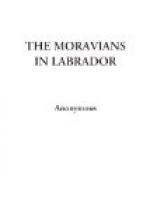An issue so disastrous to an expedition so well planned, which apparently carried within itself every rational promise of prosperity, was calculated to throw a damp upon any renewal of missionary enterprize in that quarter; and it did so with those who imagined that they themselves could command success, if their projects were judiciously concerted, and the means sufficiently supplied. It had no such effect on that eminent servant of God, Count Zinzendorff. When the mournful accounts of the uncertain fate of Erhardt and his companions reached that nobleman, he was grieved, yet not distressed—perplexed, yet not in despair; for he saw much mercy mingled in the dispensation, and was thankful to God that four brethren had returned safe. Next year the vessel Hope re-visited the coast of Labrador, under the command of Captain Goff. He heard that some dead bodies had been found and buried, and that the missionary station had been burned, but no further particulars were ever learned. In this manner ended the first commercial adventure and first mission to Labrador—enforcing, in a salutary and impressive manner, the fundamental maxim of the brethren, that worldly speculation ought never to be joined with Christian enterprize.
Notwithstanding this failure, the brethren did not relinquish the hope that God would, in some way or other, direct them how to reach these savages, and there were not wanting men who showed a strong desire to carry the gospel among them. In particular, Jans Haven, a carpenter, from the moment he heard that Erhardt had been killed by the Esquimaux, could never get rid of the powerful impulse, and in his retirement constantly employed himself with charts and books relating to the subject, and by every means endeavoured to make himself acquainted with the inhabitants, customs, climate and situation of Labrador.
In the year 1758, Haven received a call to assist the Greenland missionaries in founding the new settlement of Lichtenfels. He then for the first time told Count Zinzendorff, that during six years he had cherished the idea of going to Labrador to make known to the heathen their Creator and Saviour. At first the Count hesitated whether he should allow him to go to Greenland, but upon consideration, he thought it would be better for him to proceed thither; and on taking leave, and giving him his blessing, he said, “Go first to Greenland and learn the language, and the Saviour will do the rest.” He accordingly went thither, and was honoured, along with M. Stach, to promote the second settlement in that country.
With all the attachment and love, however, which he soon conceived for the Greenlanders, his predilection for Labrador never abated, while his determination to serve the Lord in those regions was ever present to his mind; and when in 1762 he returned to Germany, he laid his desire before the Conference at Engen, which at that time had the direction of the Brethren’s Unity, and offered to undertake personally a voyage




